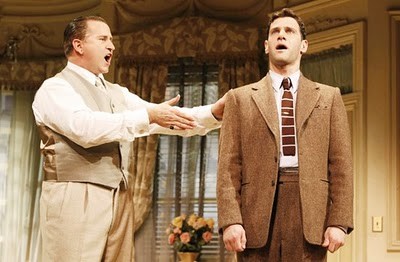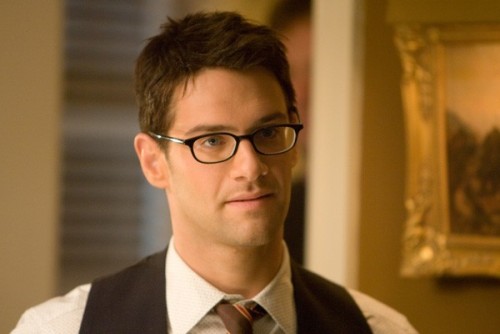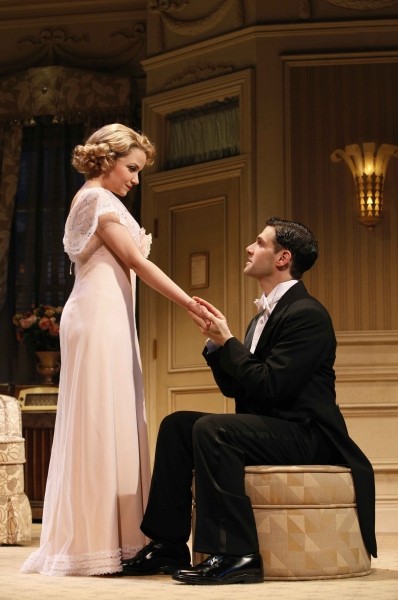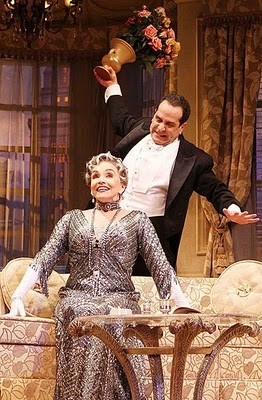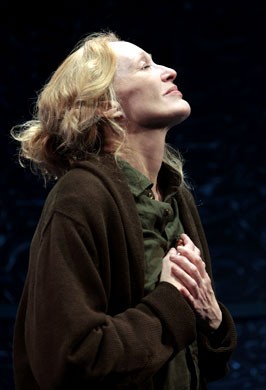Lend Me A Tenor on Broadway
Ken Ludwig's Play Tony Award Nominated
By: Susan Hall - May 05, 2010
Lend Me A Tenor
By Ken Ludwig
Directed by Stanley Tucci
Music Box Theater
New York
Scenic Design John Lee Beatty
Costumes Martin Pakledinaz
Lighting Kenneth Posner
Sound Peter Hylenski
Anthony LaPaglia, Tito Merelli
Tony Shalhoub, Saunders
Justin Bartha, Max
Brooke Adams, Julia
Mary Catherine Garrison, Maggie
Jennifer Laura Thompson, Diana
Jay Klaitz, Bellhop
Jan Maxwell, Maria
Recently challenged to write a tweet length synopsis of operas, we did one for Lend Me A Tenor, a play which is all about opera: Dweeb gofer-to-opera-impresario wants big tenor career and impresario’s daughter. Gets both.
How he does is the hilarious subject of Lend Me A Tenor, which comes out of opera buffa not seria, thank heaven. The Dweeb is played by Justin Bartha, Catherine Zeta Jones’ romantic interest in the upcoming film, The Rebound. Like Clark Kent, Bartha is a muscular Otello with glasses off and in dweeb mode when he is bespectacled, until….
Stanley Tucci, whose vast array of talents are now on display as a director, finds twists and turns in every phrase and gesture, particularly the doors opening and closing. In the elegant hotel suite which is the setting for the play, there are five doors on prominent display. The bathroom and closet doors, two exits to the hallways, and the door separating the living room from bedroom are in constant use. Bubbles waft provocatively from the bathroom door, suggesting other available pleasures.
Like all opera impresarios, Tony Shaloub, inhabiting the beleaguered Saunders, is waiting for his tenor to arrive for rehearsal. The blogosphere was full of comment about hot tenor Jonas Kaufmann’s late arrival at the Metropolitan Opera this spring. Peter Gelb the Met’s general manager introduced a series of HD screenings with the wistful remark, “No one can be late or sick for these (canned productions).” No producer of live performance is safe from Saunders’ problems.
Tito Merelli, Il stupendo, is to sing Otello, the dark Moor, in a benefit performance. Anthony LaPaglia has jumped from his Tony-award winning performance in a very sober Arthur Miller play into his broad and yet touching operatic role without a missed breath or beat. He arrives whip lashed by his over-the-top wife played by Jan Maxwell. Maxwell is one of only four actresses ever to get double Tony nominations. One is for her role as Maria in this play. She is delicious, a harridan wife, who after retail therapy in which she spends every cent of her husband’s money, tries again to entrance her errant Tito. Maybe.
A triumvirate of women are here to distract and win the tenor, trying to get his autograph, which is defined more broadly than ever before. They are the wonderful Mary Catherine Garrison Jennifer Laura Thompson and Brooke Adams.
Garrison plays the impresario’s daughter and swoons at the mention of Merelli’s name. He kissed her palm at La Scala. Thompson, sexy in sequins and silk as Diana, wants only an introduction to the general manager of the Metropolitan Opera in New York. All of this in taking place in rinky dink Cleveland, after all. Everyone involved finds the problems just as large as they would be in Milan or New York, except Diana, who needs to jump start her career through Merelli.
Brooke Adams dressed like “the Chrysler Building,” is the Cleveland version of the Met’s Mercedes Bass, who fantasizes about stepping out on the stage herself. Bass’s first choice would be to sing Violetta in Verdi's La Traviata with Placido Domingo as her Alfredo: "Actually, I would probably like to do all of it. I would like to direct it, I would like to produce it, I would like to design the costumes." Would she be one of those impossibly demanding divas? "[The] Met general manager…would say yes!" Bass reports. The Grand Tier at the Met is named after her.
With Julia, you feel that a tumble with any tenor would be reward enough. Anyway it is hard to think of Julia selecting Bach's Concerto for Two Violins, to console her after "an unsuccessful and sad romantic experience." Bass’s experience!
Jay Klaitz as the bellhop reminds us that he is not an actor waiting for his chance. No, he is an opera singer waiting to be discovered by Il stupendo. While he gripes about his first tip, a quarter, he gets so swept up in the pursuit of a Merelli autograph that he forgets tips altogether.
Don’t be intimidated or put off by opera references. Bits and pieces of Carmen, Rigoletto and Otello are heard as background, but are so minimal they fall under “fair usage” rules – too small to be of note.
If you do by chance want a singing lesson, you will get the lesson of your life from Il Stupendo. In sum, it is shake, rattle and roll.
Great opera composers like Verdi and Puccini point out that the audience is always right. This play has been produced worldwide since it was first created decades ago. Audiences love it. Why not? It’s pure fun.

